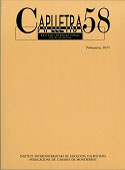Appreciative suffixation in Catalan: lexical innovations and morphological consequences
DOI:
https://doi.org/10.7203/caplletra.58.7137Keywords:
appreciative derivation, neologisms, nominal inflection, inflectional marks, gender, Catalan Abstract
Abstract
Abstract: The position of the appreciative derivation within morphology is exceptional, because, although the limited information that grammars and dictionaries reveal as for its formation and use, speakers freely use appreciative forms in familiar and informal contexts and often create new words without the restraints traditionally imposed by grammatical norms. As we will see, although the shape of these forms presents some variation, it complies with some well-defined constraints. Th is paper presents new data in this fi eld collected through traditional corpora and internet, with a two-fold aim. The first purpose is to thoroughly examine the morphological characteristics of the appreciative suffixation in Catalan, with special reference to the categories usually ignored in the literature (i.e., appreciative forms derived from categories other than nouns, adjectives and verbs). The second purpose has to do with the distributional restrictions that traditional words and new creations show with respect to the endings they allow, in order to identify the true nominal inflectional marks of Catalan.
Key words: appreciative derivation, neologisms, nominal inflection, inflectional marks, gender, Catalan.
 Downloads
Downloads
Downloads
Published
How to Cite
-
Abstract781
-
PDF (Català)678
Issue
Section
License
Authors submitting work to Caplletra for publication must be the legitimate holder of the usage rights. Legitimacy for the purposes of publishing the work must also include images, tables, diagrams and any other materials that may complement the text, whether they are the author of such material or not.
Copyright: on publishing their work in the journal, the author grants Caplletra. Revista Internacional de Filologia usage rights (reproduction, distribution and public communication) for both the paper printed version and for the electronic version.
All work published in Caplletra is covered by the Creative Commons license type Attribution-NonCommercial-NoDerivatives 4.0 (CC BY-NC-ND 4.0).
RESPONSABILITY
Caplletra. Revista Internacional de Filologia does not necessarily identify with the points of view expressed in the papers it publishes.
Caplletra. Revista Internacional de Filologia accepts no responsibility whatsoever for any eventual infringement of intellectual property rights on the part of authors.






